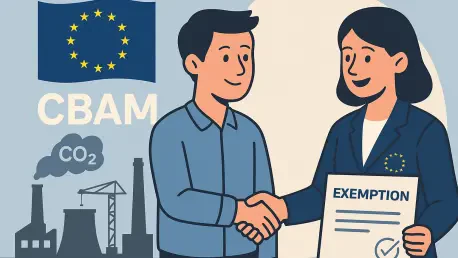What happens when a small business, already stretched thin by tight budgets and endless regulations, faces a new carbon tax that could cost thousands annually? Across the European Union, thousands of small and medium-sized enterprises (SMEs) have been staring down the barrel of the Carbon Border Adjustment Mechanism (CBAM), a policy designed to tax carbon-intensive imports. Yet, a groundbreaking exemption has just shifted the game, sparing over 90% of these businesses from its burdensome duties. This isn’t just a minor policy update—it’s a pivotal moment for small importers struggling to balance growth with compliance.
The significance of this exemption cannot be overstated. With over 182,000 businesses now relieved of the financial and administrative weight of CBAM reporting, the EU has sent a clear message: environmental goals must coexist with economic fairness. This decision, passed with overwhelming support in the European Parliament, offers a lifeline to SMEs while maintaining the integrity of climate objectives. The following sections dive into the details of CBAM, the specifics of the exemption, expert opinions, and practical steps for businesses to capitalize on this opportunity.
Why Small Businesses Should Pay Attention to Carbon Tax Relief
For many small business owners, the idea of a carbon tax might seem like a distant concern, overshadowed by day-to-day challenges like payroll or inventory. However, the CBAM policy, without this exemption, could have added significant costs and paperwork to their operations. By exempting importers handling less than 50 tonnes of carbon-intensive goods annually, the EU has directly addressed the vulnerability of SMEs, which often lack the resources of larger corporations to navigate complex regulations.
This relief translates to real savings. Consider a small steel importer who might have faced thousands of euros in annual compliance costs under the original CBAM rules. Now, with this exemption, those funds can be reinvested into hiring staff or upgrading equipment. The policy ensures that smaller players aren’t crushed under the weight of environmental regulations meant to target bigger polluters.
Moreover, this move highlights a broader shift in EU policy toward balancing sustainability with competitiveness. Small businesses, often the backbone of local economies, can breathe easier knowing that their growth isn’t being stifled by disproportionate burdens. This exemption isn’t just about dodging a tax—it’s about creating space for innovation and resilience among SMEs.
Unpacking CBAM and Its Business Implications
At its core, the Carbon Border Adjustment Mechanism serves as a border tax on carbon-heavy imports such as steel, cement, and fertilizers. Rolled out in a transitional phase since a couple of years ago, it aims to prevent carbon leakage—where companies move production to countries with laxer environmental rules—and to level the playing field for EU producers bound by strict climate standards. Starting next year, importers will be required to report emissions and pay duties, a process that could overwhelm smaller firms without substantial support.
The stakes are high, with over 182,000 businesses initially impacted by these requirements. For many SMEs, the challenge isn’t just financial but logistical—tracking carbon footprints demands expertise and systems that smaller operations often lack. Without intervention, this policy risked sidelining countless small importers unable to keep up with the administrative demands.
Understanding CBAM’s intent is key to appreciating the exemption’s value. While the mechanism pushes for a greener economy, its potential to disproportionately harm smaller players sparked concern among policymakers. This tension between environmental ambition and economic reality set the stage for the recent legislative change, ensuring that climate goals don’t come at the expense of small business viability.
Decoding the Exemption: Who Gains and How?
The recent EU decision to exempt SMEs importing less than 50 tonnes of CBAM goods annually marks a targeted effort to ease regulatory pressure. With a parliamentary vote of 617 in favor and only 18 against, this measure shields over 90% of SMEs—approximately 182,000 businesses—from the costs and complexities of emissions reporting and duties. For a small cement importer, this could mean avoiding expenses that might otherwise force price hikes or layoffs.
Beyond direct savings, the exemption aligns with the EU’s broader “Omnibus Package” initiative, unveiled earlier this year, which focuses on slashing red tape for smaller enterprises. This isn’t about letting businesses off the hook—nearly all emissions are still tracked under CBAM—but about recognizing that SMEs need a practical buffer. The policy allows these companies to prioritize growth over grappling with intricate compliance processes.
A tangible example illustrates the impact: a family-run hardware supplier importing small quantities of aluminum can now redirect resources toward expanding product lines instead of hiring consultants to manage carbon reports. This relief fosters a competitive edge for SMEs, ensuring they aren’t sidelined by regulations designed with larger corporations in mind. The exemption stands as a pragmatic compromise, preserving environmental accountability while supporting economic diversity.
Insights from Leaders and Experts on the Ground
The near-unanimous support for this exemption in the European Parliament reflects a unified stance on protecting SMEs. Italian MEP Antonio Decario, a key figure behind the proposal, emphasized that the measure “facilitates competitiveness and growth for EU businesses,” framing it as a win for economic vitality. His perspective highlights the deliberate intent to nurture small enterprises within the broader climate agenda.
Green Austrian lawmaker Lena Schilling offered a complementary view, describing the exemption as a model of deregulation that upholds environmental standards. She noted that while most companies benefit from reduced bureaucracy, the system still ensures accountability for emissions. This balance, according to Schilling, proves that supporting SMEs doesn’t require sacrificing climate commitments—a sentiment that resonates across political lines.
Industry voices add depth to the discussion, with expert David Cruz from CEMAsys advising businesses to approach future CBAM developments with steady preparation rather than alarm. Meanwhile, concerns from international figures, such as U.S. Energy Secretary Chris Wright, point to potential friction ahead, citing “huge legal risks” for American firms under CBAM’s scope. These diverse perspectives underline a shared recognition of the exemption’s immediate benefits, tempered by awareness of looming challenges in the policy’s evolution.
Actionable Strategies for Small Businesses to Benefit
For SMEs qualifying for this CBAM exemption, strategic planning is essential to maximize the opportunity. Start by verifying eligibility—ensure that annual imports of CBAM goods fall below the 50-tonne threshold. Redirecting the funds that would have gone toward compliance into areas like marketing or product development can provide a competitive boost in a crowded market.
Staying ahead of policy shifts is equally critical. The European Commission plans a CBAM review by the end of this year, potentially expanding the mechanism to include downstream products, which could indirectly affect supply chains. Monitoring these updates through trade associations or EU resources ensures that businesses aren’t caught off guard by future changes, maintaining operational stability.
Finally, consider leveraging this exemption as a chance to build a sustainable brand image. Voluntary emissions reporting, even if not required, can appeal to eco-conscious consumers and partners. Engaging with local business networks for guidance on related EU regulations under initiatives like the Omnibus Package can also provide clarity and support. These proactive steps position SMEs to thrive under the current relief while preparing for whatever comes next.
Reflecting on a Balanced Policy Shift
Looking back, the EU’s decision to exempt over 90% of SMEs from CBAM duties stood as a calculated effort to harmonize environmental goals with economic needs. The overwhelming parliamentary backing, with 617 votes in favor, underscored a collective commitment to safeguarding small businesses. This policy carved out breathing room for thousands of importers who might have otherwise struggled under the weight of compliance.
As businesses adapted, the focus shifted toward actionable next steps. SMEs were encouraged to reinvest saved resources into growth, stay vigilant about upcoming CBAM reviews, and explore voluntary sustainability measures to strengthen market presence. Engaging with trade networks for ongoing support emerged as a practical way to navigate the evolving regulatory landscape.
Beyond immediate relief, the exemption sparked broader discussions about refining carbon policies for fairness. Future considerations included balancing international trade tensions and expanding CBAM’s scope without alienating smaller players. This moment in EU policy history highlighted the potential for nuanced solutions, urging stakeholders to advocate for regulations that support both the planet and the people driving its economies.









